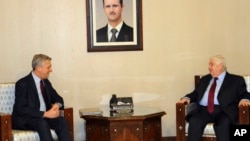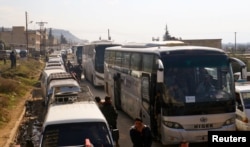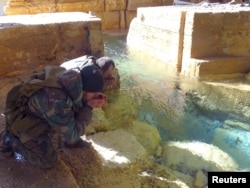Syria warned Monday of safe zones for civilians that U.S. President Donald Trump has expressed interest in creating, saying it would have to come in coordination with the Syrian government, otherwise it would be unsafe and violate the Arab nation's sovereignty.
The announcement was made in Damascus by Foreign Minister Walid al-Moallem during a meeting with the head of the U.N. refugee agency UNHCR, Filippo Grandi, who began an official visit to Syria on Monday.
The announcement came about a week after the Trump administration's expressed interest in setting up safe zones for civilians in war-torn Syria, an idea that was greeted with caution by Russia and Turkey, who have taken the lead in the latest peace efforts to end the Mideast country's devastating six-year war.
Safe zones proposed during election
The idea of safe zones, proposed by both Republican Donald Trump and Democrat Hillary Clinton during the U.S. presidential election campaign, was ruled out by the Obama administration for fear it would put U.S. aircraft in harm's way with Russia waging an air campaign to aid Syrian President Bashar Assad's forces since September 2015.
The recent rapprochement between Russia and Turkey, a key backer of Syrian rebels which now has thousands of troops in northern Syria, in theory makes the creation of safe zones more achievable. So does Trump's pledge to mend ties with Moscow.
However, Syrian state news agency, SANA, said the foreign ministry and UNHCR officials agreed that any attempt to impose safe zones without coordination with the Syrian government will be an “unsafe act and will pose a violation of the Syrian sovereignty.”
Refugees told to return home
Meanwhile, Al-Moallem called on all Syrians refugees who fled the war in their homeland to return home, pledging that the government will meet all their needs.
It was not clear if the call was related to Trump's signing of executive orders placing a 90-day ban on travel to the U.S. by citizens of Iraq, Syria, Iran, Sudan, Libya, Somalia or Yemen, and a 120-day suspension of the U.S. refugee program. Syrians are indefinitely blocked from entry.
Syria's conflict, which began in March 2011, has displaced half the country's population and sent more than four million Syrians as refugees, mostly to neighboring countries.
SANA said al-Moallem briefed Grandi on the “huge efforts” the Syrian government is exerting to improve the living conditions of its people and the displaced as well.
For his part, Grandi stressed that the offering of humanitarian aid will continue.
Rebel, families leave Barada Valley
Earlier on Monday, the Syrian military said the evacuation of rebels and their families from the Barada Valley as part of an agreement to surrender the capital region's primary water source has been completed.
The military said via the Telegram messaging system that 1,142 fighters and 760 members of their families have been evacuated from the region northwest of the capital Damascus. They were taken in buses to the rebel-held northwestern province of Idlib.
The evacuation marks the end of a nearly six-week-long standoff between rebels and pro-government forces that led to severe water cuts to some 5 million people around Damascus.
Syrian state TV reported later Monday that pumping water to some neighborhoods of the capital resumed after technical teams fixed some of the pumps at the Ein al-Fijeh spring. It said work is ongoing to fix all pumping stations in the area in what would mark an end to the weeks-long water crisis.
Snow hampers evacuation
The military said more people are to be evacuated from the nearby village of Harira but it has been delayed because the roads are closed with snow.
Meanwhile, the Russian military said its heavy bombers struck the Islamic State group in eastern Syria on Monday, the latest in a series of such raids in recent days.
The Russian Defense Ministry said six Tu-22M3 bombers flew from their base in Russia to strike IS targets in the province of Deir el-Zour. It followed four previous such raids January 21-25. Monday's raid targeted two militant command facilities along with weapons and ammunition depots and militants.
Syrian troops have been struggling to repel an IS offensive in Deir el-Zour since earlier this month. The extremists control the entire province except for a small pocket of the provincial capital and a nearby air base.






